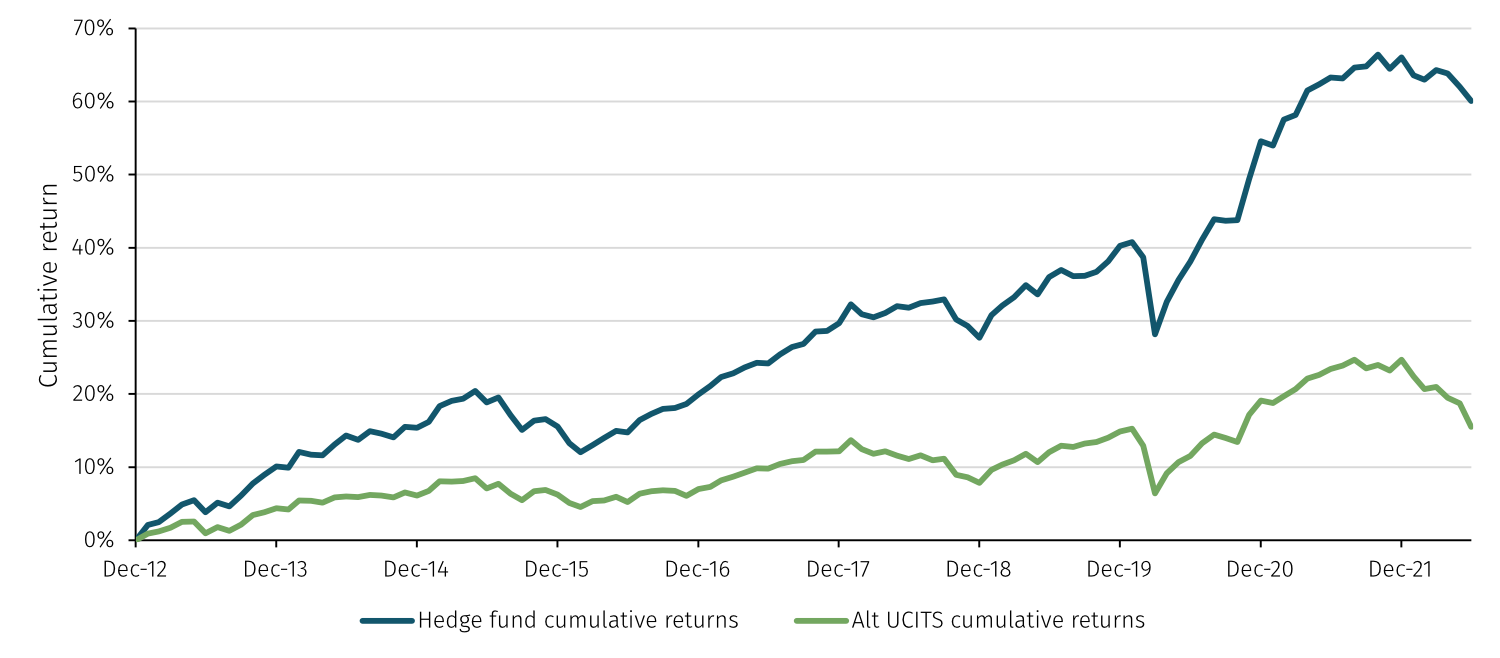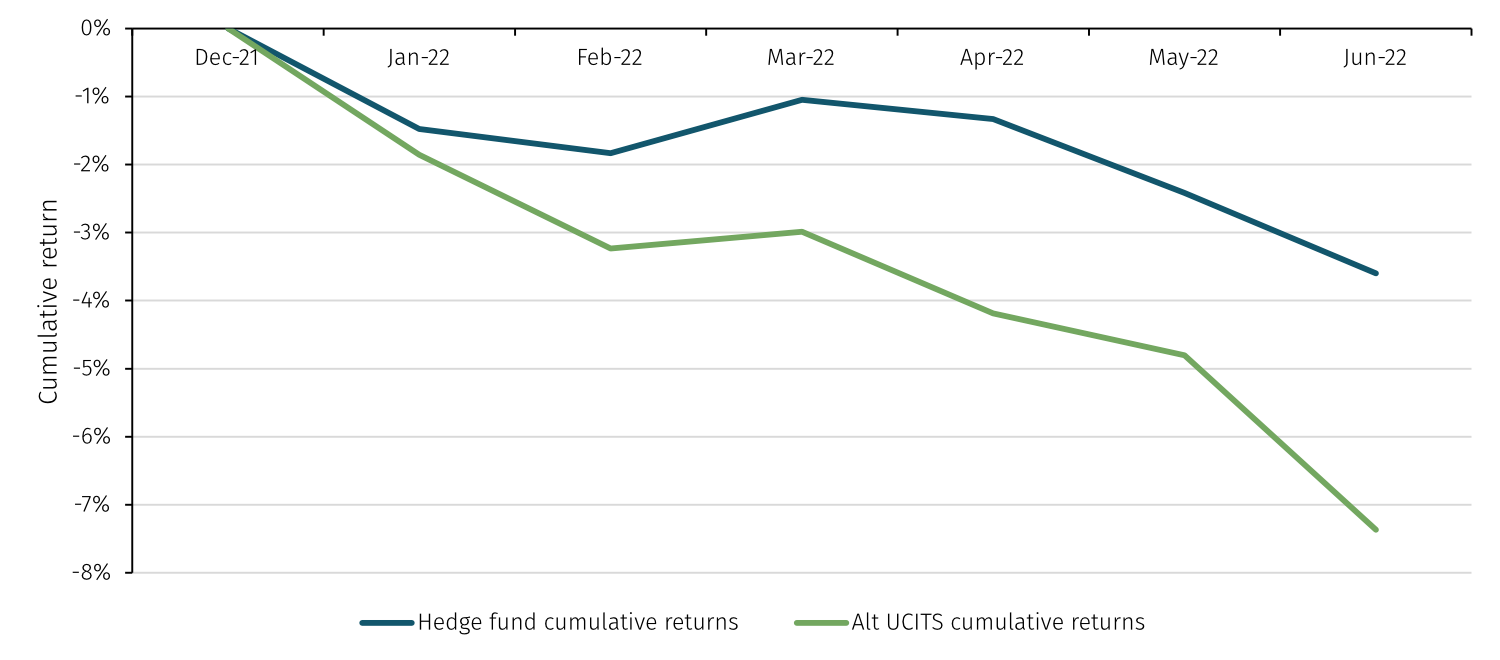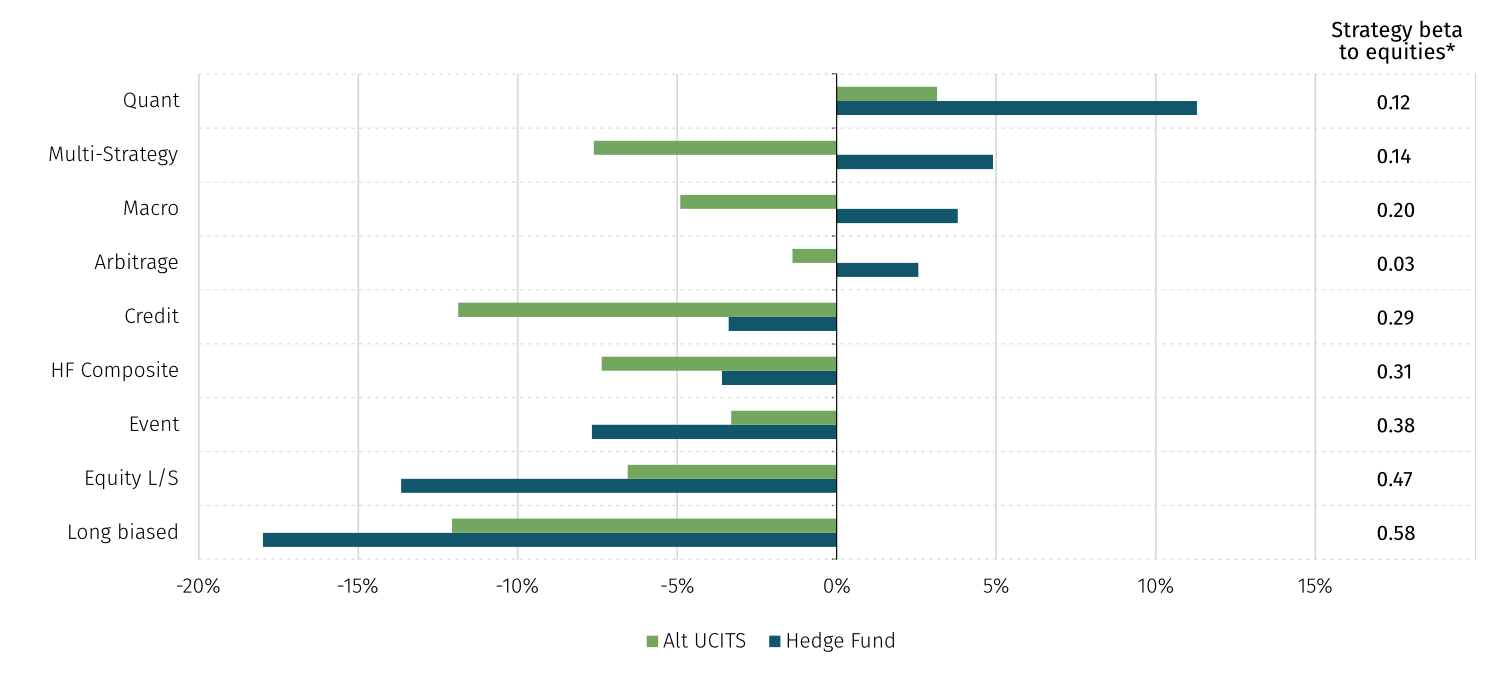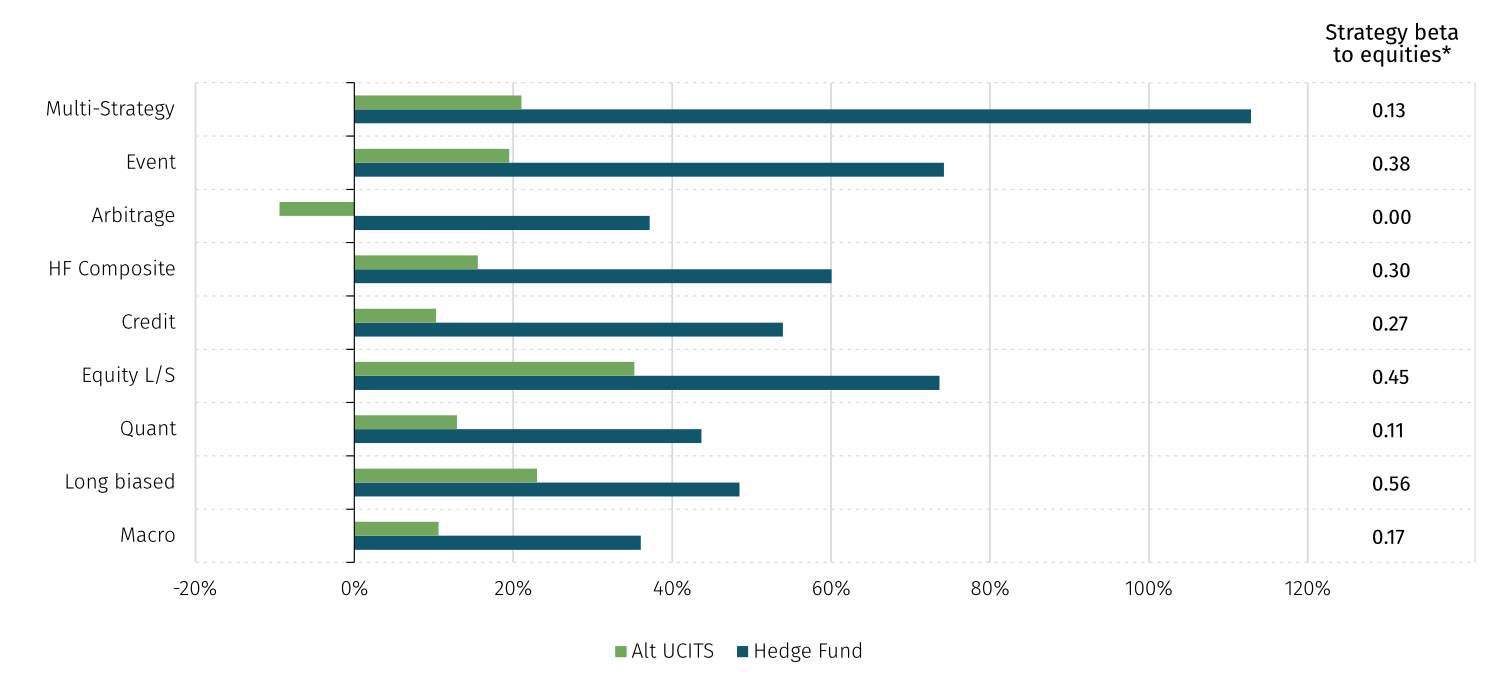Hedge Fund Data

Does structure matter? Hedge funds v alternative UCITS – H1 2022 update
Earlier this year we wrote about the growing performance gap that has emerged between hedge funds and their alternative UCITS (“alt UCITS”) counterparts between 2013 and the end of 2021.
Alt UCITS are regulated funds which, due to incremental expansion of eligible assets over the years, have brought hedge fund-like investment strategies to non-institutional investors.
Hedge funds are largely unconstrained in their investment style and the instruments traded. Alt UCITS funds are subject to additional rules on fund terms, concentration, liquidity, portfolio transparency and instruments traded. They also tend to have lower fees than the “two and 20” seen in traditional hedge funds.
Considering the significant volatility in traditional assets and diverging hedge fund strategy performance so far this year, the below update gives further insight following on from our last piece.
LONG-TERM CUMULATIVE RETURNS OF HEDGE FUNDS V ALT UCITS

Source: Aurum Hedge Fund Data Engine
Both hedge funds and alt UCITS have experienced negative performance so far this year. As these are index-based returns (asset weighted), they represent average numbers which conceal significant dispersion at the strategy and underlying manager level in both hedge funds and alt UCITS. But we can clearly see that alt UCITS have significantly underperformed their hedge fund counterparts.
2022 CUMULATIVE RETURNS OF HEDGE FUNDS V ALT UCITS

Source: Aurum Hedge Fund Data Engine
When we look at the industry in aggregate both since 2013 and year-to-date, hedge funds have outperformed alt UCITS funds, however this is not consistent across all strategies.
PERFORMANCE – JAN – JUN 2022

Source: Aurum Hedge Fund Data Engine *Strategy beta to equities is calculated using all funds with all legal structures within the strategy grouping’s 60-month beta to equities, represented by S&P Global BMI (USD).
So far in 2022, hedge funds performed significantly worse than alt UCITS funds in long biased, equity l/s and event strategies. It is interesting to note that these strategies are those with the highest long-term beta to equities (using S&P Global BMI (USD)). Although, we note that using the Capital Assets Pricing Model (CAPM)* does not account for other factors contributing to beta, but these are equity-focused strategies. Strategies with lower beta to equities, where performance may be derived more from alpha, have delivered much stronger performance and protection for investors’ portfolios.
If we look at hedge fund and alt UCITS performance by strategy since 2013, the relationship between high beta strategies and poor performance noted in 2022 is less evident. Perhaps this is unsurprising considering the equity bull market over the period. But regardless of the beta to equities of the strategies, hedge funds have outperformed alt UCITS across all strategies.
PERFORMANCE – JAN 2013 – JUN 2022

Source: Aurum Hedge Fund Data Engine *Strategy beta to equities is calculated using all funds with all legal structures within the strategy grouping’s Jan 13 – Jun 22 beta to equities, represented by S&P Global BMI (USD).
In conclusion, the perceived benefits of alt UCITS continue to come at a significant opportunity cost for investors. Volatility in traditional assets so far this year and investor concern about rising inflation has seen investors seek alternatives. When considering an allocation to alternatives, investors must consider whether the preferential funds terms and additional rules that are specific to alt UCITS funds offer “protection” for their portfolios in times of weakness, and whether these benefits outweigh the opportunity cost of lost returns.
We explore the difference between alt UCITS and hedge fund performance in more detail in the recently published H1 2022 deep dive report which you can read here.
*The Capital Assets Pricing Model is a formula for calculating the expected return of an asset given its risk. It is a theoretical portrayal of how financial markets price equities, and so it gives an expected return for capital investments.
ERi=Rf+βi(ERm−Rf)
Where:
ERi= expected return of investment
Rf= risk-free rate
βi= beta of the investment
(ERm−Rf)= market risk premium
The Hedge Fund Data Engine is a proprietary database maintained by Aurum Research Limited (“ARL”). For information on index methodology, weighting and composition please refer to https://www.aurum.com/aurum-strategy-engine/. For definitions on how the Strategies and Sub-Strategies are defined please refer to https://www.aurum.com/hedge-fund-strategy-definitions/
Data from the Hedge Fund Data Engine is provided on the following basis: (1) Hedge Fund Data Engine data is provided for informational purposes only; (2) information and data included in the Hedge Fund Data Engine are obtained from various third party sources including Aurum’s own research, regulatory filings, public registers and other data providers and are provided on an “as is” basis; (3) Aurum does not perform any audit or verify the information provided by third parties; (4) Aurum is not responsible for and does not warrant the correctness, accuracy, or reliability of the data in the Hedge Fund Data Engine; (5) any constituents and data points in the Hedge Fund Data Engine may be removed at any time; (6) the completeness of the data may vary in the Hedge Fund Data Engine; (7) Aurum does not warrant that the data in the Hedge Fund Data Engine will be free from any errors, omissions or inaccuracies; (8) the information in the Hedge Fund Data Engine does not constitute an offer or a recommendation to buy or sell any security or financial product or vehicle whatsoever or any type of tax or investment advice or recommendation; (9) past performance is no indication of future results; and (10) Aurum reserves the right to change its Hedge Fund Data Engine methodology at any time and may elect to supress or change underlying data should it be considered optimal for representation and/or accuracy.
Disclaimer
This Post represents the views of the author and their own economic research and analysis. These views do not necessarily reflect the views of Aurum Fund Management Ltd. This Post does not constitute an offer to sell or a solicitation of an offer to buy or an endorsement of any interest in an Aurum Fund or any other fund, or an endorsement for any particular trade, trading strategy or market. This Post is directed at persons having professional experience in matters relating to investments in unregulated collective investment schemes, and should only be used by such persons or investment professionals. Hedge Funds may employ trading methods which risk substantial or complete loss of any amounts invested. The value of your investment and the income you get may go down as well as up. Any performance figures quoted refer to the past and past performance is not a guarantee of future performance or a reliable indicator of future results. Returns may also increase or decrease as a result of currency fluctuations. An investment such as those described in this Post should be regarded as speculative and should not be used as a complete investment programme. This Post is for informational purposes only and not to be relied upon as investment, legal, tax, or financial advice. Whilst the information contained in this Post (including any expression of opinion or forecast) has been obtained from, or is based on, sources believed by Aurum to be reliable, it is not guaranteed as to its accuracy or completeness. This Post is current only at the date it was first published and may no longer be true or complete when viewed by the reader. This Post is provided without obligation on the part of Aurum and its associated companies and on the understanding that any persons who acting upon it or changes their investment position in reliance on it does so entirely at their own risk. In no event will Aurum or any of its associated companies be liable to any person for any direct, indirect, special or consequential damages arising out of any use or reliance on this Post, even if Aurum is expressly advised of the possibility or likelihood of such damages.








